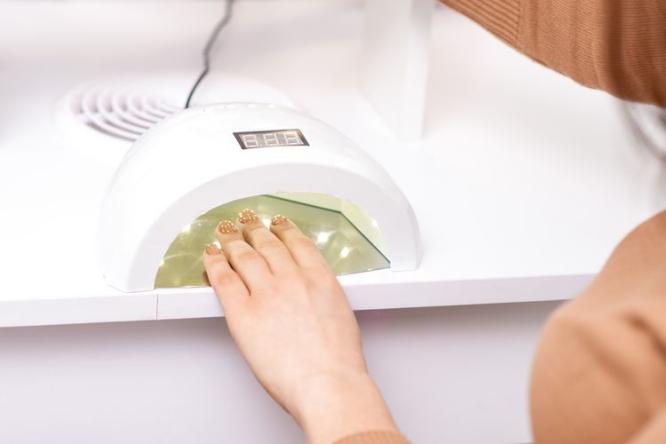In short, yes.
Your wedding manicure is a very special part of your bridal beauty look: This cosmetic detail spotlights your wedding ring, the symbol of your lifelong union. With zero drying time, a shiny finish, and long-lasting results, gel manicures are a popular choice that brides tend to gravitate toward for their big day.
Much like a regular manicure, the process for this type of beauty treatment entails prepping your nails by cutting, filling, and shaping them before applying polish. The difference, however, is that in between coats, you’ll place your hand underneath a UV lamp (for up to a minute) to dry and cure the polish. While these devices speed up the drying process and help extend the duration of your manicure up to three weeks (twice as long as a regular manicure), they expose your skin to ultraviolet A radiation (UVA), which has raised concerns about the safety of these dryers and their impact on your health.
Since UV lamps are a routine part of gel manicure appointments, whenever you place your hand beneath the light, you’re exposing your skin to UVA radiation, the same type of radiation that comes from the sun and tanning beds. UVA radiation has been linked to several skin concerns, which is why many have questioned the safety of UV lamps for gel manicures. Here are some of the concerns.
A recent study published in Nature Communications1 found that radiation from UV nail dryers can damage your DNA and cause permanent cell mutations, meaning UV lamps may increase your risk of skin cancer. Several other studies have also established a correlation between UV light and skin cancer, including melanoma, basal cell skin cancer, and squamous cell skin cancer. Ultimately, the risk depends on the frequency, so the more often you get a gel manicure, the higher your chances are of getting cancer.
There’s also evidence that UVA radiation causes premature aging, wrinkles, dark spots, thinning of the skin, and loss of elasticity. Since the skin on your hand is thinner than that of other parts of your body, aging occurs at a more rapid rate, which makes this area particularly sensitive to the impact of UV light.

Post time: Jul-11-2024





